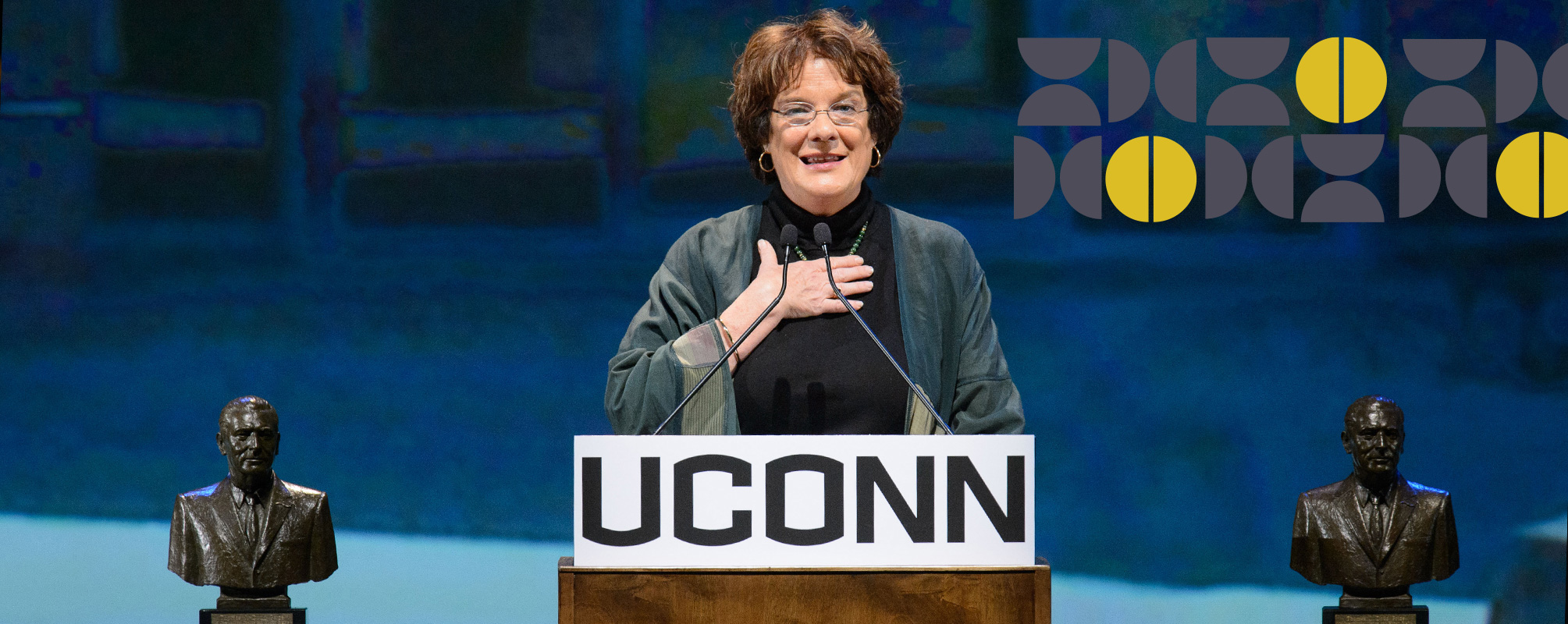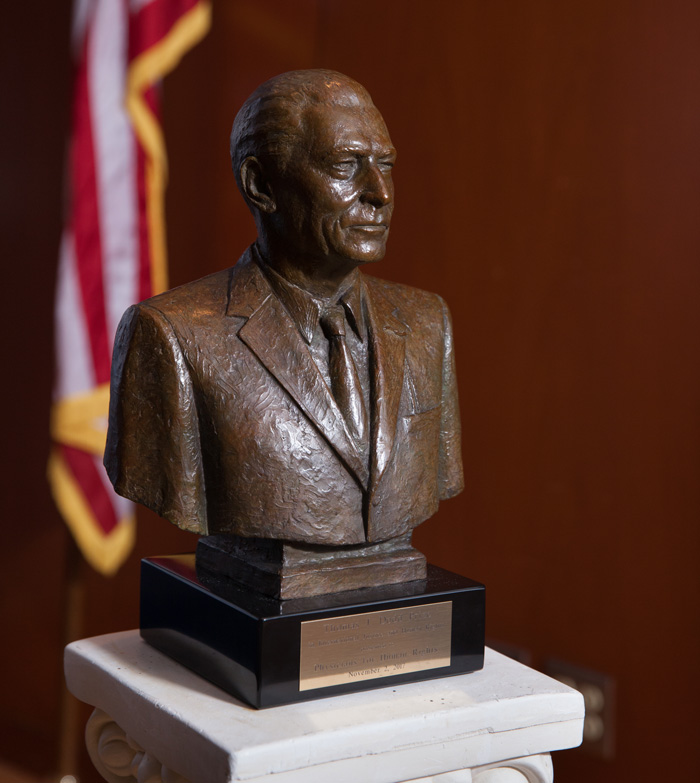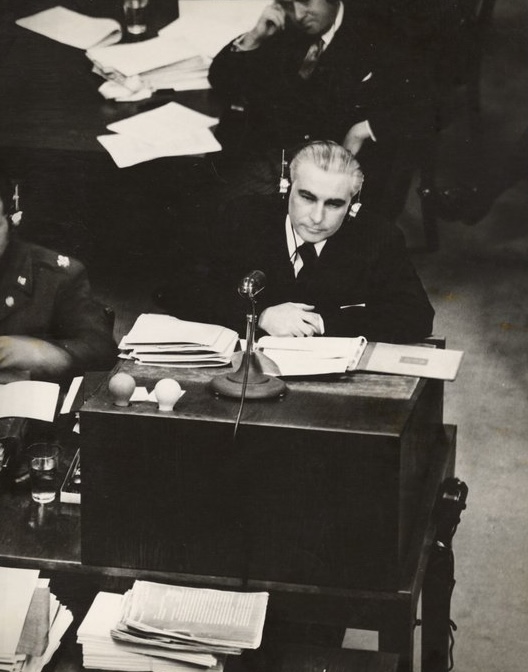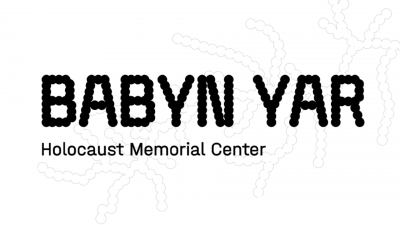
The University of Connecticut awards the Thomas J. Dodd Prize in International Justice and Human Rights biennially to an individual or group who has made a significant contribution to the advancement of international justice and global human rights. The Prize commemorates the distinguished public service career of Thomas J. Dodd, who served as Executive Trial Counsel at the International Military Tribunal in Nuremberg, as U.S. Representative from 1953 to 1957 and as Connecticut’s Senator from 1959 to 1971.
The 2023 Dodd Prize is made possible by the continuing efforts of former U.S. Senator Christopher J. Dodd and members of his family and the generous support of John W. Kluge, which has allowed the University to establish an endowment for purposes of the award.


Thomas J. Dodd
Senator Thomas J. Dodd devoted his life to public service, the rule of law, and the rights of the oppressed. Born in Norwich, Connecticut in 1907, Thomas Dodd graduated from Providence College and went on to receive a law degree from Yale University in 1933. The following year, he married Grace Murphy of Westerly, Rhode Island. The couple became the parents of six children, Thomas J. Jr., Carolyn, Jeremy, Martha, Christopher, and Nicholas. In 1945, when the Allied Powers established the International Military Tribunal in Nuremberg, Germany, Dodd was appointed Vice-Chairman of the Review Board and later Executive Trial Counsel. Dodd took a leading role in developing the legal strategies and policies during the trial, concentrating on proving the charge of conspiracy to wage aggressive war, the horrors of the concentration camp system, and the activities of Nazi organizations like the Gestapo and SS. Dodd’s work in bringing Nazi war criminals to justice earned him the Medal of Freedom and a Presidential Certificate of Merit.
After his return to the U.S., Dodd practiced law in Hartford and became active in Democratic Party politics. He was elected to Congress from the First District in 1952 and 1954. In 1959, he began the first of two terms in the United States Senate, where he championed gun control legislation, supported the civil rights initiatives of Presidents Kennedy and Johnson, and worked to protect children through efforts to curb violence on television and stem the traffic in illegal drugs. Internationally, Dodd vigorously opposed Soviet Communism and was outspoken in his support for the peoples held captive behind the Iron Curtain. Dodd died at his Old Lyme home on May 24, 1971. In commemoration of his life and career in public service, the University of Connecticut awards the Thomas J. Dodd Prize in International Justice and Human Rights biennially to an individual or group who has made a significant contribution to the advancement of international justice and human rights around the world.
Dodd Prize Endowment
The Dodd Prize would not be possible without the generous support of philanthropist and businessman John W. Kluge. Kluge, who was born in Germany, immigrated to the United States and grew up in Detroit, Michigan. He graduated from Columbia University and served in U.S. Army Intelligence during World War II. Kluge began developing his business empire by first investing in the food business, then purchasing radio and television stations that ultimately became Metromedia Incorporated, one of the largest communications conglomerates with interests in radio, television, motion pictures, cellular telephones and the travel industry.
Mr. Kluge has a wide range of philanthropic interests that include gifts to support minority students at Columbia University, to the Library of Congress to establish a John W. Kluge Center and support a Kluge Prize in Human Sciences and has donated land and his estate to the University of Virginia.
Mr. Kluge began supporting the Thomas J. Dodd Research Center prior to its completion. He was closely connected with Thomas Dodd because of their common interest in media and television. His initial gift during the capital campaign for the Dodd Center established a fund for the Dodd Prize and Mr. Kluge's additions to the endowment allowed the Center and the University to carry out the first Dodd Prize event in 2003.
Mr. Kluge was the recipient of an honorary degree from the University of Connecticut in May 2003. He passed away in September 2010.
2023 Recipient – Babyn Yar Holocaust Memorial Center
 The Holocaust was the systematic, state-sponsored persecution and murder of six million European Jews by Nazi Germany and its allies and collaborators. It was an evolving process of destruction that took place throughout Europe between 1933 and 1945.
The Holocaust was the systematic, state-sponsored persecution and murder of six million European Jews by Nazi Germany and its allies and collaborators. It was an evolving process of destruction that took place throughout Europe between 1933 and 1945.
Building on an escalating campaign of anti-Jewish policies and measures that dispossessed Jews of their human and civil rights, Nazi plans for the persecution of Jews became radicalized in 1941. Beginning that year, in a plan referred to as the “Final Solution to the Jewish Problem,” Nazi leaders decided to implement the deliberate and targeted mass murder of European Jews.
After Germany’s invasion of the Soviet Union on June 22, 1941, German killing units, often with the assistance of local collaborators, began to carry out mass shootings of entire Jewish communities. These mass shooting operations took place in more than 1,500 cities, towns, and villages across Eastern Europe.
One of the deadliest single massacres occurred in a ravine called Babyn Yar, just outside the capital city of Kyiv in Ukraine. On September 29-30, 1941, German police units and their auxiliaries murdered 33,771 Jews at Babyn Yar. The ravine at Babyn Yar remained a killing site until the fall of 1943. Over those two years, it is estimated that the Nazis murdered between 70,000 and 100,000 people, Jews and non-Jews, at Babyn Yar.
By the end of the Holocaust, nearly two out of every three European Jews had been killed. There were also millions of other victims of Nazi persecution and murder. These included political opponents, Jehovah’s Witnesses, homosexuals, habitual criminals, asocials, Afro-Germans, people with mental or physical disabilities, Roma, Poles and other Slavic peoples, and Soviet prisoners of war.
In order to acquire, study, and disseminate knowledge about this tragedy, an international foundation was established to support the creation of the Babyn Yar Holocaust Memorial Center. This non-governmental organization is building the first modern Holocaust museum in Eastern Europe, establishing a center for the study of the tragedy, in which large-scale scientific and educational activities will be carried out. The Memorial Center will bring together a museum, research institutes, a library, an archive, and an online multimedia platform. In the coming year, the Center’s focus will be the development of online projects dedicated to biographies of victims of the Babyn Yar tragedy, creation of a visual archive, and the comprehensive study of the distant and recent past of this territory. In undertaking these activities, the Memorial Center maintains an open dialogue with Ukrainian society and pays special attention to the public discussion of the tragedy and its role in Ukrainian national memory.
Past Recipients
2019 - Bryan Stevenson and the Equal Justice Initiative
2017 - Physicians for Human Rights
2015 - President Bill Clinton and Tostan
2013 - Business and Human Rights Resource Centre
2011 - The Center for Justice and International Law
2009 - The Committee to Protect Journalists
2007 - The Center for Justice & Accountability and Disability Rights International (formerly Mental Disability Rights)
2005 - United Nations High Commissioner for Human Rights Louise Arbor and The Honorable Richard J. Goldstone
2003 - Taoiseach Bertie Ahern, T.D. and The Right Honourable Tony Blair